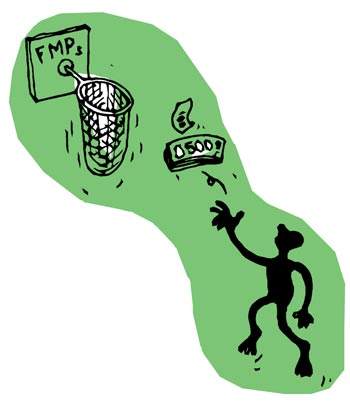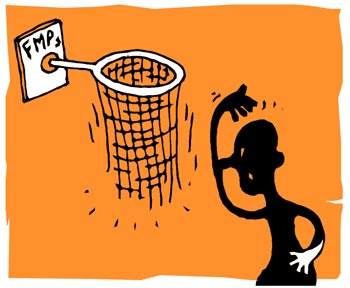
Since the last year, fixed maturity plans, or FMPs in short, have been gaining considerable popularity among conservative investors.
The prime reason for this lies in investors seeking a safer alternative to equity funds, with decent returns and tax efficiency.
So how good are FMPs?
Does it really pay to invest in them, or should one consider investing in traditional bank deposits?
InvestmentYogi breaks down the key features of how FMP works.
...

FMPs are pure debt mutual funds which invest in fixed income instruments, such as bonds, government securities, money market instruments, commercial paper (CP), certificate of deposit (CD), and may be even bank deposits.
The plans have a pre-specified tenure ranging from 15 days to three years, and returns are received by investors only on maturity of the scheme. Thus, the portfolio of a FMP is locked for the tenure of the plan.
So how do FMPs work?
The portfolio of a FMP consists of various fixed income instruments with matching maturities. The fund manager of the scheme, on the basis of the tenure of the FMP, invests in instruments in such a way, that all of them mature around the same time.
During the tenure of the plan, there would be no transactions, reviewing or churning of the portfolio by the fund manager. All the units of the plan would be held until they mature on a pre-specified date.
Thus, investors could get an indicative rate of return of the plan. Generally as a norm, FMPs are closed ended funds, though there are a few exceptions of open ended FMPs too.

Low sensitivity to interest rates
FMPs have a low sensitivity to interest rate risks that arise from fluctuations in bond prices and interest rates. All instruments in the plan are held until maturity, thereby ensuring a fixed rate of return for investors.
NAV of a FMP
NAV of a FMP does not change regularly. If an investor has chosen a FMP for a fixed tenure, it could well be treated as a fixed deposit, as the NAV would remain the same during the course of the plan tenure.
Low expenses
Unlike other mutual funds, FMPs have low management costs and expenses. This is because all instruments are held until maturity, and there is no regular involvement of the fund manager to review or churn the portfolio.
Safety factor of FMP
Even though a FMP may be investing in relatively safe fixed income investments, theoretically they are not completely risk free.

FMPs often face credit risk, or in other words the probability that the debt issuing company may not repay the principal. For the benefit of investors, various credit rating agencies rate debt instruments on the basis of the financial health of companies floating them, to indicate the risk associated with it.
An investment in a high rated debt instrument with a rating of say AAA or AA is generally, considered to have very low risk.
Liquidity risk
FMPs also face certain amount of liquidity risk. All instruments in a FMP are held till maturity. However, in case of any unforeseen circumstances, if a FMP is forced to sell a security, it could have limited options, and may be forced to liquidate in an illiquid market.
Also, the yield of a FMP is just indicative and the actual yield is entirely determined by the yields of the securities it has invested in.
Premature withdrawal of FMP
For any premature withdrawal, a steep exit load of 1 per cent to 3 per cent is charged. Therefore, one should invest in the scheme, only if the money would not be required until scheme maturity.
Withdrawal options vary from scheme to scheme and investors should be aware of the options by going through the offer document before entering a particular scheme.

Dividend
The dividend received from a FMP is tax free in the hands of the investor. However, a dividend distribution tax (DDT) of 14.16 per cent is to be borne by the investor.
Short-term capital gain
For any short term capital gain, the amount is added to the income for the year, and taxed as per the applicable income tax slab.
Long-term capital gain
For FMP investments of more than a year, long term capital gains is taxed at 10 per cent, without indexation benefit, or at 20 per cent with indexation benefit.
Double indexation benefit
FMP investments offer investors the benefit of double indexation. By staying invested for a little more than a year, the investor would be covering two financial years. With double indexation, the investor thus gets the advantage of indexing his investments to inflation for two years, while staying invested for only a period slightly more than a year, thereby lowering his tax burden.
New direct tax code
According to the new DTC expected from April 1, 2012, certain changes have been proposed to this current calculation of capital gains and DDT.

So are FMPs a better alternative to the traditional fixed deposits? Here is a comparison between the two products.
FDs: Guarantees investors a fixed rate of return.
FMPs: Returns are only indicative and not guaranteed, due to the low levels of risk associated. On maturity, there is a possibility that the actual returns received may vary from the indicated returns.
FDs: The interest earned is added to the income and taxed at applicable tax slabs. Also it does not offer any indexation benefits. The tax thus could erode the profits earned.
FMPs: Offer better post tax returns than fixed deposits. They also provide indexation benefits for investors. This is one of the main reasons why FMPs have an edge over fixed deposits.
FDs: Premature withdrawal charges are a negligible amount between 0 per cent to 1 per cent.
FMPs: Charge high exit loads for premature withdrawals.
FDs: Don't have any restrictions and are available at any time, throughout the year.
FMPs: Being closed ended in nature, generally available only during the initial NFO (New Fund Offer).

Investors need to keep in mind the following points before investing in FMP.
To sum up, FMPs certainly qualify as a low risk investment tool, paying decent returns. It is advisable for investors to weigh the pros and cons in relation to their own risk appetite and financial goal before taking the plunge.